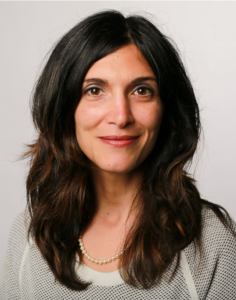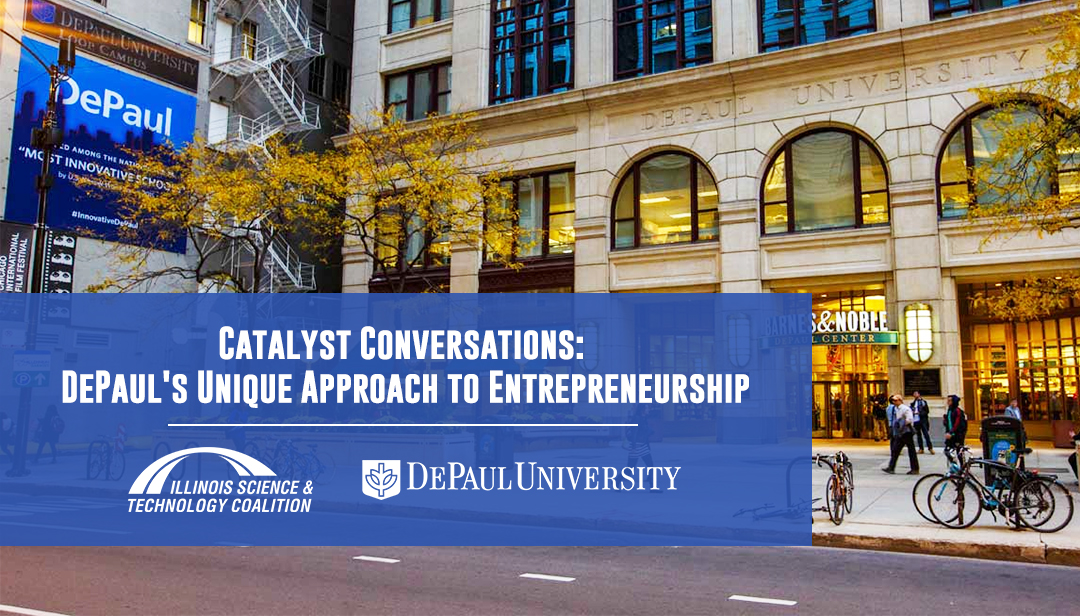Q&A WITH MARYAM SALEH
Executive Director of the Kaplan Institute for Innovation and Tech Entrepreneurship,
Illinois Institute of Technology
In this issue of Catalyst, we sit down with Maryam Saleh, Executive Director of the Kaplan Institute for Innovation and Tech Entrepreneurship at the Illinois Institute of Technology. We discuss the Kaplan Institute under her new leadership, updates on the Kaplan Institute since its founding, and the future of the tech ecosystem in Chicago and the state of Illinois.
Subscribe to get the Catalyst newsletter sent to your inbox.
1. Tell us about your background as well as your current role with the Illinois Institute of Technology. What attracted you to Kaplan?
For most of my career, I’ve straddled the infamous ‘valley of death’ – the gap between research and commercialization, helping research ideas get to market, where they can have an impact. I was a founding member at Cyberkinetics, a neurotechnology startup that used a brain implant to restore movement in paralyzed people. I founded a medical device innovation fellowship program at Northwestern and was part of the launch team at MATTER. Most recently, I worked with Machinify, a Silicon Valley-based startup that applies machine learning to automate healthcare payer operations. I’m currently executive director of the Ed Kaplan Family Institute for Innovation and Tech Entrepreneurship, Illinois Tech’s interdisciplinary innovation hub. I was attracted to the Kaplan Institute because of the diversity of backgrounds and thought that can be found within Illinois Tech’s student body. As my predecessor pointed out, there’s an immediate opportunity to leverage the incredible depth and breadth of perspectives and experiences here at Illinois Tech to solve the lack of diversity in Chicago’s technical talent pool. I’m a computer engineer and computational neuroscientist with business acumen, so I was also attracted to the opportunity to support venture creation and the development of an entrepreneurial mindset in students across a variety of complex technical fields. I believe that building businesses can benefit from influences in the design world, so the exposure to creative, non-linear thinkers through the Institute of Design was also compelling.
2. Give us an overview of the Kaplan Institute. What is the new mission of the Institute under your leadership?
Now more than ever, universities have a responsibility to teach the next generation of tech leaders the power of inclusive innovation, especially as we help the world recover from the pandemic. Supply chains in every industry are disrupted, companies are struggling to manage their remote workforce, teachers are still catching up to new tech and their students’ adjusted learning habits, and vaccines and treatments need to be optimized to address new variants. It’s not the time to sit on the sidelines, and we need students like those at Illinois Tech with the desire to roll up their sleeves, work collaboratively across disciplines, and learn by creating actual solutions to some of today’s most pressing global challenges. The Kaplan Institute at Illinois Tech embraces this moral imperative and is firmly committed to instilling the entrepreneurial mindset in every graduate. By committing to teach students from all backgrounds how to discover, create, and solve, we work towards a more equitable future, where innovators represent the diversity of the people they seek to serve. We will know we have succeeded when our alums are the tech leaders of Chicago and beyond, and we have provided a seat at the table of innovation for those who have traditionally been left out of those critical conversations.
“Now more than ever, universities have a responsibility to teach the next generation of tech leaders the power of inclusive innovation, especially as we help the world recover from the pandemic.”
3. It’s been 2.5 years since we last profiled IIT and the Kaplan Institute, can you tell us about the progress/evolution the center has made since its founding?
I am proud of how actively and intentionally we are deepening our ties with the community. We firmly believe that by serving as the conveners of community, industry, academic, and student partners throughout Chicago, we can amplify the impact of our work and further elevate the city’s position as a global technology leader. We have designed programs where we partner with community organizations, small businesses, and corporate leaders to expose our students to real world problems then co-develop solutions with them, not just for them. To do this well, we’ve had to focus on a number of verticals – industry sectors that align with Illinois Tech’s core capabilities. We are also building our programs with an eye toward inclusivity to ensure that the solutions that we work on are true to Illinois Tech’s founding purpose to liberate the collective power of difference to advance technology and progress for all.

Maryam Saleh, Illinois Institute of Technology
4. What are some of the initiatives that the Kaplan Institute is working on in order to achieve its mission? Can you share details on any ongoing projects?
In January, we launched an entrepreneurship program and took 20 student teams through the experience. We weren’t able to accomplish this on our own – we recruited the same number of industry experts to help coach our teams and are working on launching a council of alum CEOs to mentor our future teams. Our 5 finalists plan to compete for a $50k prize pool at the student-run PITCH@IllinoisTech on June 11th. We also launched a corporate and community innovation program in 5 industry verticals and had hundreds of students participate. Just last week, we hosted Innovation Day and had the finalists in each category present their solutions to our partners for feedback. Partners included Sargent and Lundy, the Cook County Assessor’s Office, R.A.G.E. Skate Park, the Parkway Ballroom and others. We are also piloting other programs to advance equity in entrepreneurship and to have our students experience working with local tech startups. I’d be remiss not to thank startups BundlAR, DimensionInx, Biomesense and New Era ADR for working with us to pilot this last initiative.
5. What do you see in the future of the tech ecosystem of Chicagoland and the state of Illinois as a whole, and how do you see the Kaplan Institute playing a role in this future?
It’s such an exciting time in Chicago – Valor equity partners closed a $1.7B fund, 7Wire launched a $150M consumer health fund, P33 launched TechRise, startup founders united to launch LongJump; ActiveCampaign, Amount & ClearCover are Chicago’s new unicorns; and Cooley just launched a Chicago office. IllinoisTech wants to fuel the local tech pipeline with its diverse student body. The Kaplan Institute’s role will be to complement the students’ technical education with practical experiences working directly with startups and industry, so they are ready for take off. They’ll learn to be nimble, tell compelling stories, set goals and be accountable to meet them, and focus their ideas on market needs.
6. Now that you’ve been in the role for some months, what are you most excited about in this new position?
What I find most rewarding are instances when our work kindles a spark in a student. It’s such a pleasure to have a chance to inspire the next gen of leaders. Overall, I’m excited to contribute to Chicago’s economic development – I sense that numerous stakeholders are mobilized to work together on this goal and the Kaplan Institute has an important role to play in this story.

